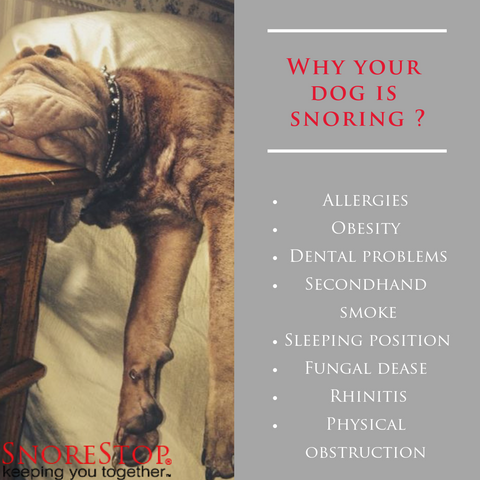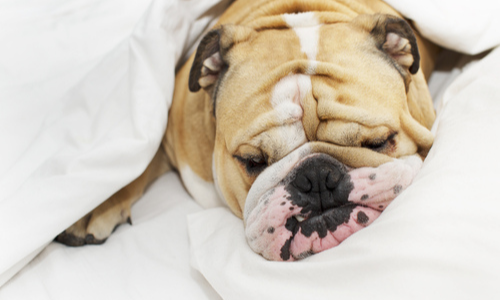Dogs may snore due to obstructions, breed characteristics, dental issues, or respiratory infections. Snoring is common in brachycephalic breeds such as Pugs and Bulldogs.
While occasional snoring is usually not a concern, sudden onset or accompanying symptoms may require a visit to the vet. Additionally, allergies, inflammation, or objects lodged in the nose can cause snoring in dogs. Regular veterinary check-ups can help identify and address underlying health issues contributing to snoring.
It’s important to monitor your dog’s overall health and well-being to ensure they’re living a happy and comfortable life.

Credit: www.facebook.com
Causes Of Dog Snoring
Have you ever wondered why your dog snores? Just like humans, dogs can snore for various reasons. Understanding the causes of dog snoring can help you determine if it’s something to be concerned about or simply a natural phenomenon. In this section, we will explore the different factors that contribute to dog snoring.
Anatomy And Breeds
One of the primary reasons why dogs snore is their anatomy. Some dog breeds are more prone to snoring than others due to their unique physical features. Brachycephalic breeds, such as Pugs, French Bulldogs, and Boston Terriers, have shorter snouts and compressed airways, making them more susceptible to snoring. Additionally, breeds like the Pekingese and Clumber Spaniel, with loose skin around their necks and throat, may also experience snoring.
Allergies And Inflammation
Allergies and inflammation can also contribute to dog snoring. Just like humans, dogs can be allergic to certain substances in their environment, such as pollen, dust mites, or certain foods. These allergies can lead to inflammation in the airways, causing difficulty in breathing and resulting in snoring. If you notice that your dog’s snoring coincides with certain seasons or exposure to allergens, it may be worth considering allergies as a potential cause.
Obesity And Airway Blockages
Obesity is another common cause of snoring in dogs. Excess weight can lead to the accumulation of fat and tissue around the throat, narrowing the airway passage and causing snoring. Additionally, airway blockages can occur due to various factors such as enlarged tonsils, nasal polyps, or foreign objects. These obstructions hinder proper airflow, leading to snoring. If your dog is overweight or has a history of airway blockages, it may be contributing to their snoring.
Health Conditions And Infections
Certain health conditions and infections can also result in snoring. For example, hypothyroidism, a condition where the thyroid gland does not produce enough hormones, can lead to weight gain and throat swelling, causing snoring. Upper respiratory infections, dental abscesses, and dental issues can also contribute to snoring in dogs. It’s important to seek veterinary attention if your dog’s snoring is accompanied by other symptoms or if it occurs suddenly.
Passive Smoking And Environmental Factors
Believe it or not, passive smoking can affect dogs and contribute to snoring. Exposure to secondhand smoke can irritate their airways, leading to inflammation and snoring. Environmental factors such as low humidity or poor air quality can also play a role in dog snoring. Ensuring a clean and healthy environment for your furry friend can help reduce snoring episodes.
In conclusion, dog snoring can be caused by various factors such as anatomy, allergies, obesity, health conditions, and environmental factors. By understanding these causes, you can take appropriate measures to manage and reduce snoring in your beloved canine companion.

Credit: snorestop.com
Breeds Prone To Snoring
If you’ve ever shared a bed with a snoring dog, you know just how disruptive it can be to a good night’s sleep. But did you know that certain dog breeds are more prone to snoring than others? If you own one of these breeds, you may already be familiar with the symphony of snorts and wheezes that can accompany their slumber. Let’s take a closer look at some of the breeds that are notorious for their snoring tendencies:
Pug
The Pug is a charming and playful breed known for its distinctive snorting and grunting noises. While some may consider these sounds as snoring, Pug owners see them as a unique lullaby. These compact and muscular dogs have a short snout and a narrowed airway, which can contribute to their snoring habits.
French Bulldog
Similar to the Pug, French Bulldogs have a similar build with a short snout and a compressed upper respiratory system. This combination makes them highly susceptible to snoring. Despite their noisy sleeping habits, French Bulldogs are beloved for their affectionate nature and playful personality.
Pekingese
Pekingese dogs, with their long, flowing coats and regal appearance, may surprise you with their snoring abilities. The flat face and narrowed air passages common in this breed can lead to snoring during sleep. If you’re considering a Pekingese as a pet, be prepared for some nighttime serenades!
Boston Terrier
Boston Terriers, known for their friendly and lively personalities, are also notorious for their snoring. These compact and muscular dogs often have a short muzzle and a flattened face, both of which can contribute to their snoring tendencies. Despite their noisy sleep habits, Boston Terriers are cherished family pets.
Black Russian Terrier
The Black Russian Terrier, with their impressive size and thick, dense coat, may not be the first breed that comes to mind when you think of snoring dogs. However, their large build and facial structure can make them prone to snoring during sleep. These loyal and intelligent dogs make excellent companions, even if they come with a little extra noise.
Clumber Spaniel
The Clumber Spaniel is a charming breed known for its gentle and affectionate nature. While their adorable droopy ears and expressive eyes steal hearts, their snoring can steal sleep. The combination of their stocky build and heavyset head can contribute to their snoring tendencies.
So, if your furry friend falls into one of these categories, you can rest assured that their snoring is more than just a pesky nighttime soundtrack. It’s simply a part of their unique breed characteristics. However, if your dog’s snoring suddenly worsens or is accompanied by other symptoms, it’s always best to consult your vet to rule out any underlying health concerns.
When To Be Concerned About Snoring
If your dog snores consistently, it is usually not a cause for concern. However, if the snoring suddenly increases or is accompanied by other symptoms, it’s time to visit the vet. Different dog breeds are more prone to snoring, especially brachycephalic breeds like French Bulldogs and Pugs.
Sudden Onset Of Snoring
If your dog suddenly starts snoring, it could be a cause for concern. Snoring that develops out of nowhere may indicate an underlying health issue that needs to be addressed. While occasional snoring is normal for many dogs, an abrupt change in snoring patterns should not be ignored. It’s important to monitor your dog closely and observe any other symptoms that may be present.Accompanied By Other Symptoms
When your dog’s snoring is accompanied by other symptoms, it’s time to consult with your vet. Keep an eye out for signs such as difficulty breathing, coughing, wheezing, sneezing, or nasal discharge. These symptoms could be indicative of an upper respiratory infection, allergies, or even a dental abscess. Your vet will be able to properly diagnose the cause of your dog’s snoring and recommend appropriate treatment options.Changes In Energy Level And Appetite
In addition to sudden snoring and accompanying symptoms, changes in your dog’s energy level and appetite could also be a cause for concern. If your dog becomes lethargic, loses interest in food, or displays a noticeable decrease in energy, it’s important to seek veterinary attention. These changes in behavior may indicate an underlying health issue that is contributing to the snoring. Regular snoring can be harmless, but when it comes to sudden onset of snoring, accompanied by other symptoms and changes in energy level and appetite, it’s best to err on the side of caution and schedule a visit to the vet. By addressing the underlying cause of your dog’s snoring, you can ensure their overall health and well-being. Remember, a healthy and happy pup means a quiet and peaceful night’s sleep for both of you!
Credit: dutchtownanimalhospital.com
Understanding The Relaxation Of Airways
Understanding the relaxation of airways can provide insights into why your dog snores. Snoring in dogs can be caused by various factors such as breed characteristics, allergies, respiratory infections, dental issues, and obesity. If your dog’s snoring is accompanied by other symptoms or occurs suddenly, it is recommended to consult with a veterinarian.
Nose
When it comes to snoring in dogs, the nose plays a crucial role. Snoring can occur when the airways in the nose become restricted or partially blocked. This can be due to a variety of reasons, including:
- Nasal congestion from allergies or infections
- Deviated septum
- Enlarged turbinates (structures inside the nose that help filter and warm the air)
Mouth
The relaxation of the airways can also happen in the mouth. The tongue, soft palate, and uvula (the dangling structure at the back of the throat) can all contribute to snoring when they become too relaxed or obstructed. Some factors that can lead to airway relaxation in the mouth include:
- Excessive tissue or floppy soft palate
- Obstruction caused by dental issues
- Growths or tumors
Throat Vibrations
Throat vibrations during snoring are caused by the turbulent airflow passing through the relaxed airways. This can happen due to:
- Weak muscles in the throat and tongue
- Obstructions or narrowing of the airway
- Excessive relaxation of the structures in the throat
Snoring in dogs is commonly seen in brachycephalic breeds such as Pugs, French Bulldogs, and Boston Terriers. These breeds are prone to having anatomical features that contribute to the relaxation of their airways.
It is important to note that while snoring is common in dogs, it can also be a sign of underlying health issues, such as hypothyroidism or upper respiratory infections. If your dog’s snoring is accompanied by other symptoms or is sudden onset, it is recommended to seek veterinary attention to rule out any underlying conditions.
Managing And Treating Dog Snoring
If your furry friend is keeping you up at night with their loud snores, there are several steps you can take to manage and treat their snoring. From weight management to reducing passive smoking, there are various approaches you can explore to improve your dog’s breathing and ensure a peaceful night’s sleep for both of you.
Weight Management And Exercise
Excess weight can contribute to snoring in dogs, just as it does in humans. If your dog is overweight, it’s essential to work towards a healthy weight through proper diet and regular exercise. Consult with your veterinarian to determine the ideal weight range for your dog’s breed and size.
Addressing Allergies And Inflammation
Allergies and inflammation can cause nasal congestion and snoring in dogs. If you suspect that your dog’s snoring is related to allergies, it’s important to identify and address the allergens in their environment. This may involve using air purifiers, keeping the living space clean, and avoiding common allergens such as pollen and dust.
Regular Dental Care
Poor dental hygiene can lead to gum infections and dental abscesses, which can contribute to snoring. Ensure that your dog receives regular dental check-ups and cleanings to maintain healthy gums and teeth. Brushing your dog’s teeth regularly can also help prevent dental issues that can lead to snoring.
Treatment For Underlying Health Conditions
In some cases, snoring may be a symptom of an underlying health condition, such as hypothyroidism or an upper respiratory infection. If your dog’s snoring is accompanied by other symptoms or if it suddenly worsens, it’s crucial to schedule a visit to the vet for a thorough examination. Treating the underlying condition can help alleviate snoring.
Reducing Passive Smoking And Environmental Triggers
Passive smoking and exposure to environmental triggers, such as strong perfumes or cleaning products, can irritate your dog’s respiratory system and contribute to snoring. Avoid smoking near your dog and ensure proper ventilation in your home. Additionally, be mindful of the products you use and opt for pet-friendly options whenever possible.
By implementing these management and treatment strategies, you can help reduce your dog’s snoring and improve their overall well-being. Remember, it’s always best to consult with your veterinarian to determine the underlying cause of the snoring and to receive personalized advice based on your dog’s specific needs.
Frequently Asked Questions On Why Does My Dog Snore?
Should I Be Concerned If My Dog Snores?
If your dog snores and it’s a consistent behavior, there’s likely no need to worry. However, if the snoring appears suddenly or is accompanied by other symptoms, it’s best to consult a veterinarian. Snoring in pets can be caused by various factors such as obstructions, breed, dental issues, and respiratory infections.
Why Does My Dog Snore When She’s Happy?
When your dog is happy, snoring could simply be a sign that she’s living the good life. It’s just who they are! However, if the snoring comes on suddenly or if accompanied by other symptoms, it is time to visit the vet.
Some dog breeds are more prone to snoring than others.
Which Dog Breeds Snore The Most?
Some dog breeds that snore the most are Pug, French Bulldog, Pekingese, Boston Terrier, and Black Russian Terrier. If your dog snores regularly and has no other symptoms, it is usually not a cause for concern. However, sudden snoring or accompanying symptoms should be checked by a vet.
Is It Unusual For A Dog To Snore?
It is not unusual for a dog to snore. Many dogs snore for various reasons, such as allergies or their anatomy. Some breeds, like Bulldogs and Pugs, are more prone to snoring. If your dog has always snored occasionally, there is usually no need to worry.
Conclusion
He muscles in the throat and nasal passage while sleeping. Other factors such as allergies, obstructions, dental issues, and certain breeds can also contribute to snoring. While occasional snoring is usually nothing to worry about, if your dog’s snoring is sudden or accompanied by other symptoms, it’s best to consult with a veterinarian.
Understanding the reasons behind your dog’s snoring can help ensure their overall health and well-being.
